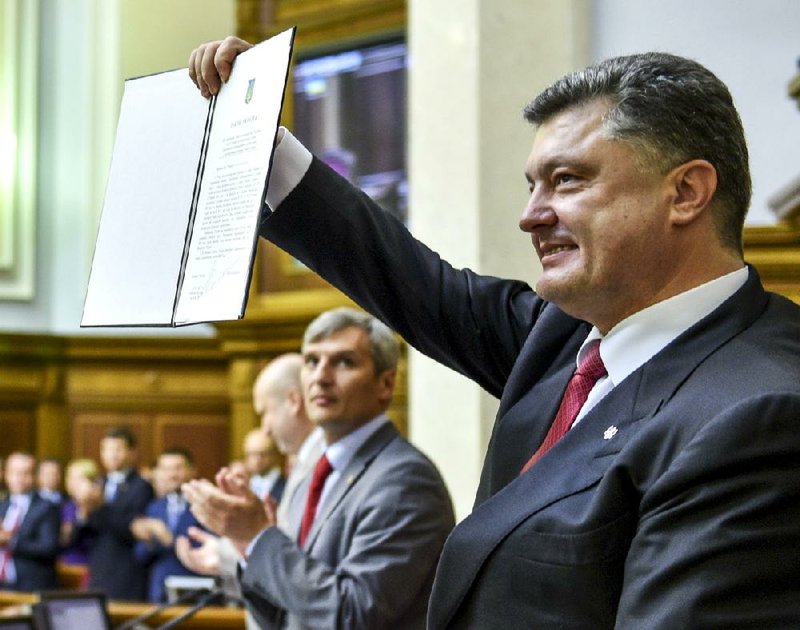KIEV, Ukraine -- Ukraine moved to resolve months of crisis Tuesday by strengthening ties to Europe and loosening some controls over the country's rebellious eastern regions where it has been fighting Russian-backed separatists.
The measure deepening the economic and political ties with Europe was the issue that sparked the crisis last fall, when then-President Viktor Yanukovych's decision to shelve the deal in favor of closer ties with Russia sparked protests by hundreds of thousands.
Those demonstrations eventually drove Yanukovych from power in February, then led to the annexation of Crimea by Moscow and the rebellion in the east, which killed more than 3,000 people before a shaky cease-fire began Sept. 5.
The deal lowers trade tariffs between Europe and Ukraine, requires Ukrainian goods to meet European regulatory standards and forces the Kiev government to undertake major political and economic changes.
After the parliament ratified the measure, lawmakers leapt to their feet to applaud and sing the Ukrainian national anthem. A live broadcast of the session was beamed to the European Parliament.
President Petro Poroshenko called the vote a "first but very decisive step" toward bringing Ukraine fully into the European Union.
He said the protesters who died in clashes with riot police in Kiev and the government troops killed by rebels in the east "have died not only for their motherland. They gave up their lives for us to take a dignified place among the European family.
"After World War II, not a single nation has paid such a high price for their right to be European," he said. "Can you tell me, who now after this will be brave enough to shut the doors to Europe in front of Ukraine?"
Earlier Tuesday, the parliament also approved laws granting temporary self-rule to rebellious, pro-Russia regions in the east, as well as amnesty for some of those involved in the fighting.
The lawmakers took that action in private, in contrast to the patriotic fanfare of the vote on the European agreement. In his speech, Poroshenko did not mention those two measures, which are likely to generate more contention among Ukrainians.
One of the laws calls for three years of self-rule in parts of eastern Ukraine and for local elections in November. It grants concessions that were not offered in a peace plan that Poroshenko put forward three months ago when he became president, such as local oversight of court and prosecutor appointments and local control of police.
A separate bill calls for amnesty for those involved in the eastern fighting, although not for persons suspected or charged with crimes including murder, sabotage, rape, kidnapping and terrorism. The law also does not grant amnesty to those who have tried to kill Ukrainian law enforcement officials and servicemen -- meaning most of the separatists, who have waged war for five months on government forces, could not be eligible.
Poroshenko was later quoted by Interfax-Ukraine as saying he felt "we are obliged to take a step to ensure that the other side takes corresponding steps" toward peace.
Alexander Zakharchenko, the leader of the rebels in the Donetsk region, told Russia's RIA Novosti news agency that the separatist leadership would study the measures. The rebels have previously said they aim for complete independence.
The measures were passed just before Poroshenko was to begin his first state visit to Canada and the U.S.. He will address a joint session of Congress on Thursday and is scheduled to speak to the U.N. General Assembly next week.
The EU association agreement was long sought by Ukrainians who want their country out of Russia's sphere of influence, and its passage was welcomed by many in Kiev.
"I participated in the protests, and we've been waiting for this for so long," said Rostislav Sezov, adding that he didn't oppose greater autonomy for regions in the east.
"Let us be smaller but better. Let us be a core that is oriented toward Europe," he said.
In Brussels, EU lawmakers overwhelmingly ratified the agreement.
"The message this sends could not be clearer: the European Parliament supports Ukraine in its European vocation," said Martin Schulz, the president of the EU Parliament. "The European Parliament will continue defending a united and sovereign Ukraine."
Russia has strongly opposed Ukraine's tilt toward the EU, and it has threatened that the reduction of tariffs on Western goods would force it to limit the influx of Ukrainian products into Russia.
In a significant concession to Moscow, Ukraine and the EU agreed last week to delay the full reciprocal implementation of a reduced-tariff regime until at least 2016.
Information for this article was contributed by Mstyslav Chernov, Juergen Baetz, Nataliya Vasilyeva, Jim Heintz and Vladimir Isachenkov of The Associated Press.
A Section on 09/17/2014


